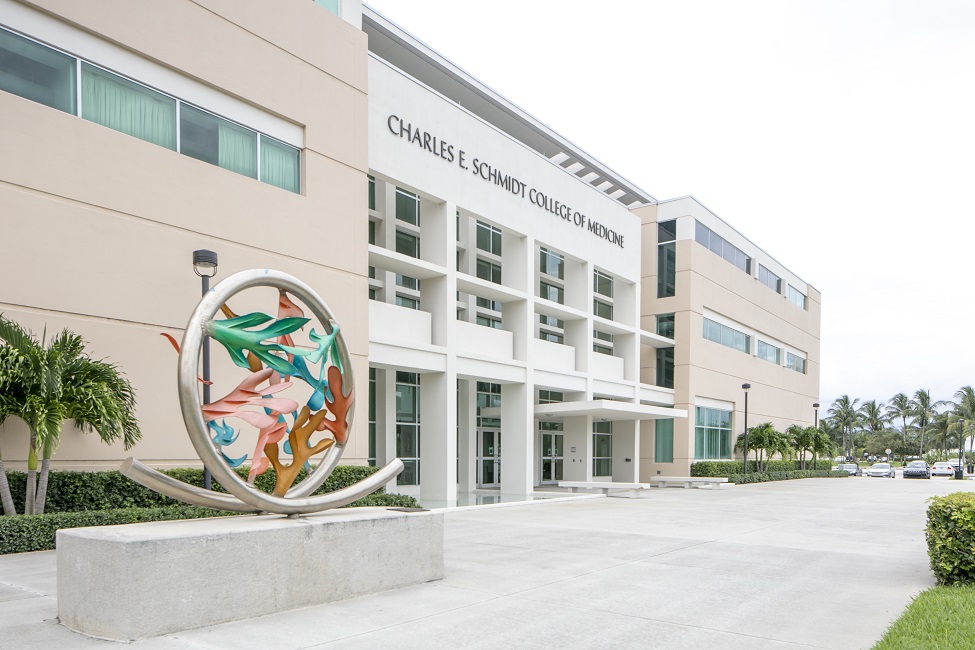FAU, Hospital Partners Strategize on Medical Residencies, Fellowships

(Photo by Alex Dolce)
Research from the Safety Net Hospital Alliance of Florida and the Florida Hospital Association estimates that Florida will be short 17,924 physicians by the year 2035.
More than a decade ago, Florida Atlantic University’s Schmidt College of Medicine and Baptist Health South Florida’s Bethesda Hospital and Boca Raton Regional Hospital, and Tenet Health’s Delray Medical Center, St. Mary’s Medical Center and West Boca Medical Center, signed an agreement to form the FAU Schmidt College of Medicine Graduate Medical Education Consortium (FAU GME). Their initial goal was to ensure that the region will have an adequate and well-trained physician workforce by establishing residency programs in specialties that would serve their communities.
The FAU GME has made great strides in helping to address Florida’s looming physician shortages through its five residency and four fellowship programs. More than 177 resident physicians and fellows go through these FAU programs each year. Since the inception of the first residency program in internal medicine in 2014, more than 199 physicians have graduated from these programs to practice specialties in internal medicine, surgery, emergency medicine, psychiatry, neurology, vascular surgery, cardiology, geriatric medicine, and hospice and palliative medicine in Florida and elsewhere. Approximately 50 percent of all graduates end up practicing in Florida.
FAU GME leaders recently met to strategize and outline the next phase for graduate medical education and residency programs in Palm Beach County, which they will launch in the fall. Medical residencies take between three to seven years to complete depending on the specialty, and are required as part of the training for medical school graduates to become board-certified physicians.
“We are excited to collaborate with our outstanding hospital partners on addressing key issues, challenges and opportunities related to graduate medical education,” said Julie Pilitsis, M.D., Ph.D., dean and vice president of medical affairs, FAU Schmidt College of Medicine. “Increasing residency positions is critical to ensuring that we attract and keep physicians here to address our state’s growing and aging population needs. Our GME consortium is a key contributor to training and securing high quality physicians. Importantly, the consortium is essential to the success of our recently launched FAU Health Network – a true collaboration that brings together the region’s already robust health care infrastructure, to help save lives and cure diseases.”
Boca Raton Regional Hospital is the primary site for FAU’s first university-sponsored residency in internal medicine with participation from Bethesda Hospital and Delray Medical Center. The general surgery training program is based at Boca Raton Regional Hospital, as well as Bethesda Hospital, Delray Medical Center, St. Mary’s Medical Center and West Boca Medical Center. The emergency medicine residency training program is based at Bethesda Hospital, St. Mary’s Medical Center and Delray Medical Center. Delray Medical Center is the primary site for FAU’s university-sponsored residency in psychiatry with participation from South County Mental Health Center, Jewish Family Services, and Boca Raton Regional Hospital. FAU’s neurology residency program is based at Boca Raton Regional Hospital. Neurology residents also have the opportunity to be involved in basic neuroscience research at FAU and work with leading clinicians at the Boca Raton Regional Hospital Marcus Neuroscience Institute.
“Our inaugural residency program in internal medicine – a first for the cities of Boca Raton, Delray Beach and Boynton Beach – marked a very important milestone in bringing additional, well-trained physicians into these communities to enhance health care delivery in this region,” said Lincoln Mendez, CEO of Boca Raton Regional Hospital. “Now, we are focused on the future of the GME consortium to continue our efforts on mitigating physician and other health care shortages to address critical workforce needs in this region and throughout our state.”
In 2020, the Kaiser Family Foundation ranked states based on the number of communities that face health professional shortages. Florida is ranked No. 5. At the top of the list is California, followed by Texas, Missouri and Alaska. According to the U.S. Health Resources and Services Administration, 279 communities in Florida have shortages of medical professionals in primary medicine, dental care and mental health.
“Together with our GME consortium partners, we will help to ensure that we bring the latest academic and research programs to our area to train the next generation of physicians who will help to improve quality of life, contribute to lifesaving research and provide exceptional care for patients of all walks of life including the most vulnerable members of our community,” said Daniel Listi, CEO of Delray Medical Center.
FAU’s residency and fellowship programs are spearheaded by Curtis Whitehair, M.D., associate dean for graduate medical education, designated institutional official and interim chair of the Clinical Neurosciences Department in the Schmidt College of Medicine.
“We are committed to building premier academic medical programs to attract the best and brightest physicians to South Florida who in turn will become leaders in their fields and specialties,” said Whitehair. “Collectively, with our consortium partners, we are helping to elevate the level of care for all patients.”
-FAU-






